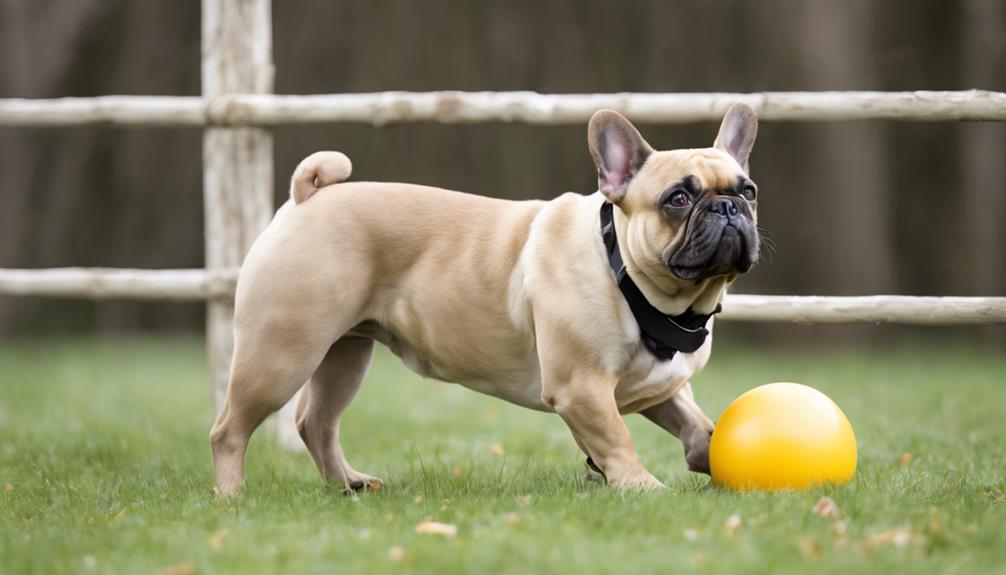What Are Effective Training Strategies for Older French Bulldogs?
If you've noticed your older French Bulldog displaying changes in behavior or struggling physically, effective training strategies tailored to their age and needs are crucial. Understanding how to adapt to their limitations and capitalize on their strengths is key.
By implementing positive reinforcement techniques and incorporating mental stimulation, you can create engaging training sessions that cater to your senior Frenchie's well-being. However, there's one aspect often overlooked that could significantly impact their training success.
Assessing Physical Limitations
When evaluating your older French Bulldog's physical limitations, it's essential to observe their movements and behavior closely. As your furry companion ages, they may not be as agile or energetic as they once were. This means that engaging in high-impact activities or intense exercises may no longer be suitable for them. To ensure your older French Bulldog remains healthy and happy, consider incorporating modified exercises and age-appropriate activities into their routine.
Modified exercises are crucial for accommodating your older French Bulldog's physical limitations. Instead of vigorous runs or strenuous activities, opt for gentler exercises like short walks, gentle play sessions, or swimming. These modified exercises can help maintain their mobility and muscle strength without putting too much strain on their aging bodies.
Similarly, engaging in age-appropriate activities is essential for keeping your older French Bulldog mentally stimulated and physically active. Puzzle toys, slow-paced games, and leisurely walks can be excellent alternatives to more demanding activities. By tailoring their daily routines to include activities that suit their age and physical condition, you can help your older French Bulldog stay healthy and content.
Understanding Behavioral Changes
To better comprehend the behavioral changes in older French Bulldogs, closely observe their interactions and responses to daily activities. Recognizing signs of behavioral changes in your older French Bulldog is crucial for their overall well-being. Keep an eye out for unusual behaviors such as increased aggression, excessive barking, sudden fearfulness, or changes in eating and sleeping patterns. These signs could indicate underlying health issues or discomfort that need to be addressed promptly.
Seeking support from a veterinarian or a professional dog behaviorist is recommended if you notice significant behavioral changes in your older French Bulldog. These experts can help identify the root cause of the behavioral changes and provide guidance on how to address them effectively. It's essential to rule out any medical conditions that may be contributing to the shifts in behavior, as older French Bulldogs are more prone to age-related health issues that could impact their behavior.
Implementing Positive Reinforcement Techniques
Implement positive reinforcement techniques to encourage desired behaviors in your older French Bulldog. Positive reinforcement is a powerful tool in behavior modification and obedience training. By rewarding your dog for good behavior, you can effectively shape their actions and responses. Here are some tips to help you implement positive reinforcement techniques successfully:
- Consistency is Key: Ensure that you're consistent in rewarding your French Bulldog every time they display the desired behavior. This will help them understand what you expect from them.
- Use High-Value Treats: Find treats that your dog absolutely loves and use them as rewards for good behavior. High-value treats can be a great motivator for older French Bulldogs.
- Timing is Crucial: Make sure to reward your dog immediately after they exhibit the desired behavior. This will help them associate the action with the reward.
- Keep Training Sessions Short and Fun: Older French Bulldogs may have shorter attention spans, so keep training sessions brief and engaging. End each session on a positive note to keep your dog excited for the next training session.
Adjusting Training Sessions Length
Adjusting the length of your training sessions can help cater to the attention span and energy levels of your older French Bulldog, ensuring effective learning outcomes. As your furry companion ages, consider shortened sessions with increased breaks to prevent mental and physical exhaustion. Older French Bulldogs may not have the same stamina as when they were younger, so adapting the duration of training can keep them engaged and motivated.
When planning your training sessions, opt for age-appropriate exercises that are gentle on your senior French Bulldog's joints and muscles. Short bursts of training interspersed with breaks will prevent overexertion and make the learning process more enjoyable for your pet. Remember, it's essential to approach training with patience and understanding, acknowledging any limitations that come with age.
Focusing on Mental Stimulation
Engage your older French Bulldog's mind by incorporating interactive puzzles and games into your training routine. Mental stimulation is crucial for keeping your furry friend's cognitive abilities sharp and providing enrichment. Here are some effective strategies to focus on mental stimulation:
- Enrichment Activities: Introduce your French Bulldog to enrichment activities that challenge their problem-solving skills. Consider puzzle toys where they've to figure out how to get a treat or interactive feeders that require manipulation to access food.
- Cognitive Toys: Invest in cognitive toys designed to stimulate your dog's mental abilities. Toys that dispense treats when solved or ones that require different actions to reveal hidden compartments can keep your Bulldog entertained while exercising their brain.
- Mental Exercise: Incorporate regular mental exercise sessions into your training routine. This could involve teaching new tricks, practicing obedience commands in different environments, or engaging in scent games that tap into your dog's natural instincts.
- Interactive Games: Play interactive games with your older French Bulldog to keep them mentally engaged. Games like hide-and-seek with treats, fetch with a twist where they've to find specific items, or even simple obedience games can provide mental stimulation and strengthen your bond.
Incorporating Health Considerations
To ensure the overall well-being of your older French Bulldog, it's vital to consider their health needs when incorporating training strategies that focus on mental stimulation.
Nutrition management plays a crucial role in maintaining your French Bulldog's health as they age. Older French Bulldogs may require adjustments to their diet to accommodate changing nutritional needs. Consult with your veterinarian to ensure your furry companion is receiving the proper nutrients to support their cognitive function during training sessions.
In addition to nutrition management, exercise modifications are essential for the health of your older French Bulldog. As your French Bulldog ages, their physical capabilities may change, requiring adjustments to their exercise routines. When incorporating training strategies that focus on mental stimulation, consider low-impact exercises to prevent strain on their joints.
Shorter, more frequent training sessions can help keep your older French Bulldog engaged without overexerting them physically.
Addressing Sensory Impairments

Considering your older French Bulldog's sensory impairments is crucial when tailoring training strategies to ensure effective communication and engagement. As your furry companion ages, they may experience changes in their senses, such as hearing or vision loss. Here are some tips to help you address sensory impairments in your training approach:
- Improving communication:
- Use hand signals: Incorporating hand signals along with verbal cues can help your French Bulldog understand commands better, especially if they've hearing impairments.
- Keep commands consistent: Consistency in your training cues is key to helping your dog follow instructions, even if they're struggling with their senses.
- Adapting environments:
- Minimize distractions: When training your older French Bulldog, choose quiet environments with fewer distractions to help them focus better.
- Use tactile cues: Incorporating tactile cues, such as gentle touches or textured mats, can aid in communication, especially for dogs with visual impairments.
Seeking Professional Guidance
To further enhance your older French Bulldog's training experience, seeking professional guidance can provide valuable insights tailored to their specific needs and abilities. Professional support offers specialized expertise that can address your French Bulldog's unique requirements as they age. Trainers who specialize in working with senior dogs understand the physical and cognitive changes that may affect training outcomes. By consulting with a professional, you can access strategies that are effective and considerate of your older French Bulldog's limitations.
Professional trainers have the knowledge and experience to create personalized training programs that cater to your French Bulldog's current capabilities. They can adapt exercises, commands, and activities to align with your dog's energy levels, physical health, and mental acuity. This tailored approach ensures that your older French Bulldog can engage in training sessions that are both stimulating and manageable.
Moreover, seeking professional guidance can help you navigate any behavioral challenges that may arise as your French Bulldog ages. Trainers can offer advice on how to address issues such as increased anxiety, reduced mobility, or sensory impairments. With their expertise, you can implement training techniques that are gentle, supportive, and effective in fostering your dog's well-being.
Frequently Asked Questions
How Can I Ensure My Older French Bulldog Stays Motivated During Training Sessions?
To keep your older French Bulldog motivated during training, try incorporating enrichment activities and mental stimulation. Use positive reinforcement to reward good behavior and keep your pup engaged.
Training motivation can be maintained by making sessions fun and interactive. Remember to keep the training sessions short and frequent to prevent boredom and ensure your French Bulldog stays enthusiastic about learning new skills.
Are There Any Specific Exercises or Activities That Can Help Improve Cognitive Function in Older French Bulldogs?
To boost cognitive function in your older French Bulldog, try incorporating cognitive games, interactive toys, puzzle feeders, and enrichment activities into their routine. These engaging exercises can help stimulate their mind and keep them sharp.
Interactive toys and puzzle feeders provide mental challenges, while enrichment activities offer variety and mental stimulation. By including these activities, you can support your older French Bulldog's cognitive health and overall well-being.
What Are Some Common Health Issues That Older French Bulldogs May Face That Could Impact Their Training?
As your older French Bulldog ages, they might face health issues like arthritis or vision problems that can affect their training. It's important to adjust their exercise needs and nutrition requirements to accommodate these changes.
Common behavioral issues in senior Frenchies include anxiety or decreased activity levels. To address these, ensure regular socialization and gentle training methods.
How Can I Modify Training Techniques to Accommodate Any Mobility Issues My Older French Bulldog May Have?
To modify training techniques for your older French Bulldog with mobility issues, focus on gentle movements and shorter sessions. Use positive reinforcement and adjust exercises to suit their abilities.
Incorporate cognitive exercises to keep their mind engaged. Consider low-impact activities like puzzle games or scent training.
Tailoring training to accommodate their needs will help maintain their mental and physical well-being.
Are There Any Specific Toys or Tools That Can Help Enhance Mental Stimulation for Older French Bulldogs During Training?
To enhance mental stimulation during training for your older French Bulldog, consider using interactive puzzles and treat dispensers. These tools can engage their minds and keep them motivated.
Enrichment games and scent training are also great options to stimulate their senses and keep training sessions interesting.
Incorporating these toys and tools into your training routine can help keep your older French Bulldog mentally sharp and eager to learn.
Conclusion
In conclusion, when training older French Bulldogs, it's important to assess their physical limitations, understand behavioral changes, and implement positive reinforcement techniques.
Adjusting training session lengths, focusing on mental stimulation, incorporating health considerations, addressing sensory impairments, and seeking professional guidance are all effective strategies to ensure a successful training experience for your senior pup.
Remember to be patient, understanding, and consistent in your approach to help your furry friend thrive in their golden years.
